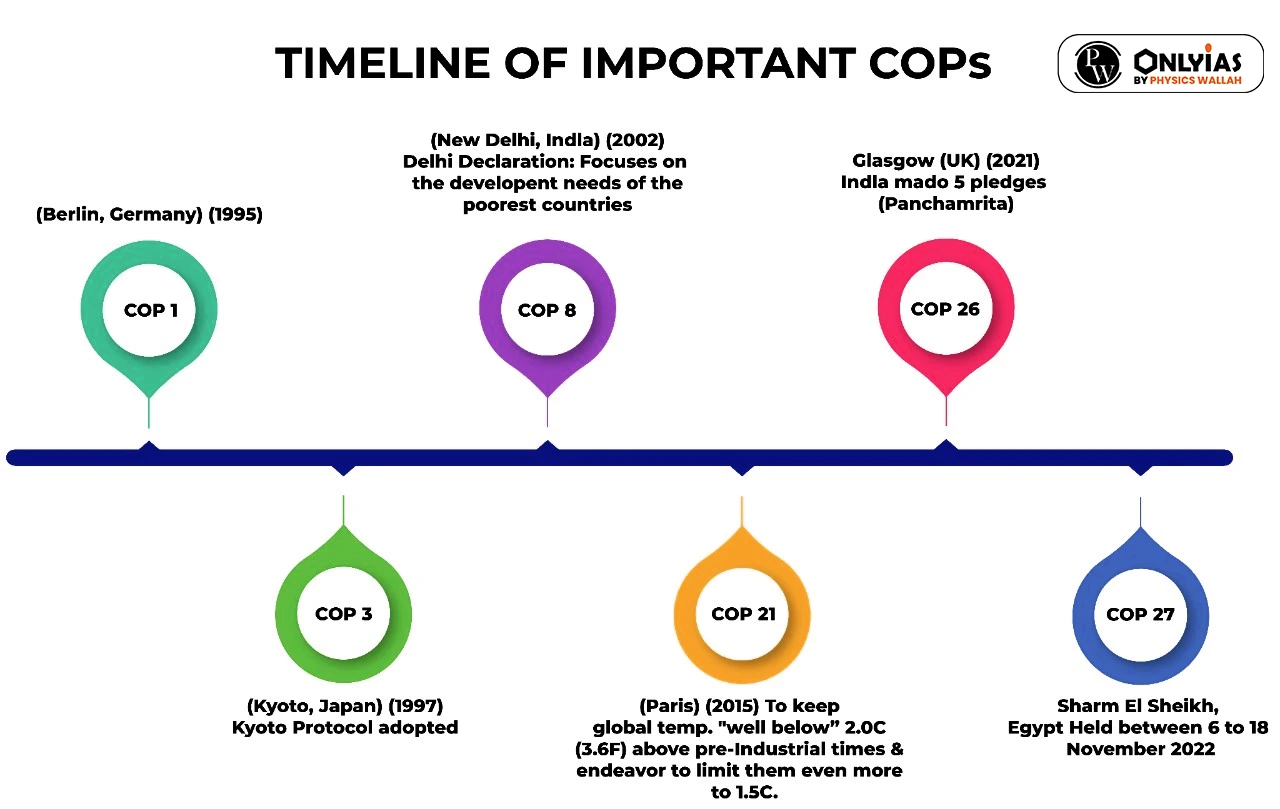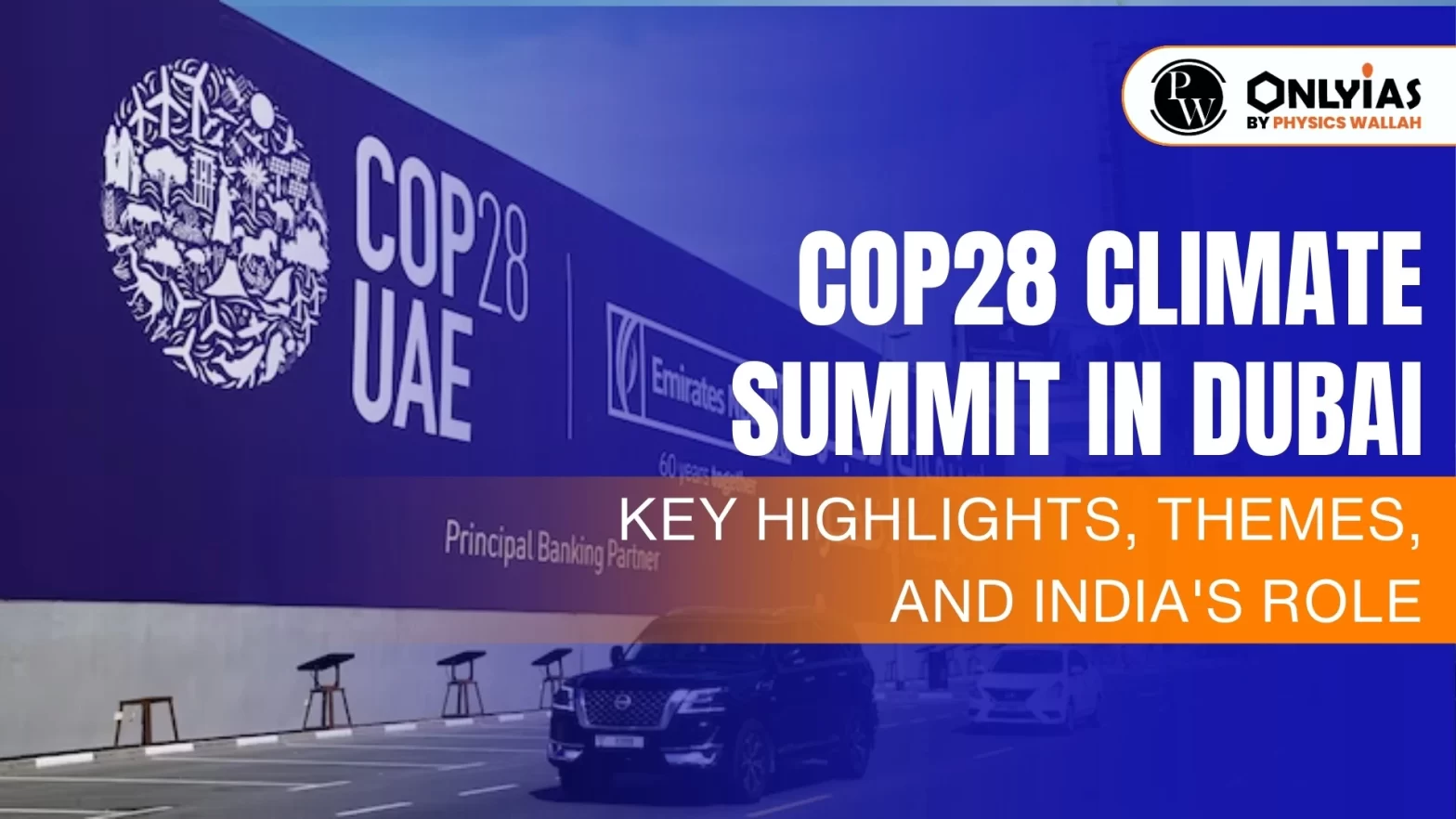Context: This article is based on the news “COP28 begins today: India’s role at the climate conferences over the years, key promises, red lines” Which was published in the Indian Express. The United Arab Emirates (UAE) is all set to host the COP28 Climate Summit (UN Climate Change Conference) from November 30 to December 12, 2023.
What are the Key Highlights of the COP28 Climate Summit?
- Amid Geopolitical Instability: This year’s COP28 climate summit holds significance in the wake of geopolitical risks that have come forth after the Israel-Hamas war and Russia’s ongoing “special military operation” in Ukraine.
- Groundbreaking Health Day: On December 3, the global health landscape marks a historic turning point as the climate-health nexus takes center stage at COP28 climate summit, a first in 28 years of climate change negotiations.
- The role of non-state actors: COP28 climate summit will consider how non-state actors, such as businesses, cities, and civil society organizations, can play a role in addressing climate change.
- Just Transition: There will be a focus on how to ensure that the transition to a low-carbon economy is fair and equitable.
- The role of innovation and technology: There will also be discussions on the role of innovation in addressing climate change and how best to transfer technology.
- The two-week COP28 climate summit will include a “global stocktake” to track how far off course the world is to keep global warming below 1.5C and what more needs to be done to close the gap.
COP (Conference of Parties):
- COPs are convened under the United Nations Framework Convention on Climate Change (UNFCCC), a multilateral treaty adopted in 1992.
- It takes place every year, and is the world’s only multilateral decision-making forum on climate change with almost complete membership of every country in the world.
- Every COP is hosted in a different region based on a rotational schedule between the five United Nations regional groups:
- The African Group
- The Asia-Pacific Group
- The Eastern Europe Group
- The Latin American and Caribbean Group (GRULAC);
- The Western European and Others Group (WEOG)
- India had hosted one of these conferences — COP8, way back in 2002.
Achievement of COP:
- Kyoto Protocol (1997): COP summit laid the Kyoto Protocol aimed to reduce greenhouse gas emissions and combat global warming by setting binding targets for industrialized countries to limit their emissions
- Paris Agreement: It was adopted by 196 Parties at the UN Climate Change Conference (COP21) in Paris, France, on 12 December 2015 to edge the global average temperature to well below 2°C above pre-industrial levels and pursue efforts to limit the temperature increase to 1.5°C above pre-industrial levels.
COP28 Climate Summit Different zones:
- Blue Zones: All of the official sessions, meetings, side events and press conferences are taking place in the “blue zone”, the formal conference and negotiation space managed by UN Climate Change.
- Green Zone: The “green zone”, is a space for youth representatives, artists, businesses and other civil society actors to discuss ideas for a net-zero future in a more informal setting.
|

United Nations Framework Convention on Climate Change (UNFCCC):
- Origin: Signed in 1992, at the United Nations Conference on Environment and Development also known as the Earth Summit the UNFCCC) is the foundational treaty that has provided a basis for international climate negotiations
- Key Principle: Common but Differentiated Responsibilities and Respective Capabilities (CBDR–RC)
- It is a principle that acknowledges the different capabilities and differing responsibilities of individual countries in addressing climate change.
- Secretariat: Bonn, Germany.
- The Convention has near universal membership (197 Parties) and is the parent treaty of the 2015 Paris Agreement.
- Institutional Structure:
- Conference of the Parties (COP): It is the supreme body to regularly reviews, devise, agrees and implements climate policy.
- COP President and Bureau: The office of the COP President normally rotates among the five United Nations regional groups. The President is usually the environment minister of his or her home country.
- Their role is to facilitate the work of the COP and promote agreements among Parties.
- Subsidiary Bodies (SBs): They provide scientific and technological advice and assess how well the Convention is being implemented
|
What are the themes of COP28 Climate Summit?
- Emissions Mitigation Targets: Countries will engage in negotiations to set ambitious emissions reduction targets, aligning with the broader goal of limiting global temperature rise set in the Paris Conference (2015).
- Phase Down vs Phase-Out: Developed nations may push for an accelerated phase-out, but developing countries, including India, face challenges in balancing energy security needs with emission reduction goals.
- Climate Finance: The provision of financial support from developed to developing nations for climate mitigation and adaptation efforts will be a contentious issue.
- For Example: Developing countries will need at least $200 billion every year by 2030 to adapt to worsening climate impacts like coastal sea rise or storms, according to the U.N.
- Industry-led solutions: COP28 climate summit will likely witness discussions on harnessing industry-led innovations to drive sustainable development and reduce carbon footprints.
- Low-carbon Innovation: Emphasis on fostering low-carbon innovations and technologies will be a key aspect of the conference, with a focus on creating a pathway for a sustainable future.
- Progress on operationalizing the Paris Agreement article: COP28 climate summit will assess progress on operationalizing the various aspects of the Paris Agreement, including mechanisms for reporting and transparency.
- Reforming the role of private sector investment: The role of private sector investment in climate actions will be under scrutiny, with discussions on how private capital can be effectively mobilized to address climate challenges. Also Read: World Climate Action Summit – COP28
What challenges is India facing at the COP28 Climate Summit?
- Cooling Pledge: India is reportedly hesitant to sign a global pledge to reduce cooling-related emissions at the COP28 climate summit, citing the need for affordable cooling in the world’s most populous country.
|
The Global Cooling Pledge, led by COP28 climate summit host the United Arab Emirates, is designed to make things like air conditioners, deep freezers and heat-dissipating homes more affordable, especially in developing countries, while reining in planet-warming emissions from the sprawling cooling sector.
|
- Luxury emissions: India has been called to reduce “luxury emissions,” encompassing emissions from sectors like oil and gas and waste, contributing to Methane Emissions.
- This demand requires a nuanced approach considering the impact on various sectors and India’s broader developmental goals.
- Loss and Damage Finance: A new CSE-Down to Earth assessment revealed that India witnessed an extreme weather event almost every other day in the first nine months of this year. Therefore, India’s emphasis would be on “loss and damage finance”.
- Coal dependence and fossil fuel phase-out: India’s reliance on coal for power production remains a contentious issue. Immediate shutdown proposals for coal-fired power plants clash with India’s emphasis on energy security.
- For Example About 73 percent of electricity consumed in India is produced using coal.
- India’s Stance on Emission Reduction: India will not agree to any proposal that asks to reduce its emissions. As India’s climate actions are framed in terms of emissions intensity, or emissions per unit of GDP, and not on emissions directly.
- India also rejects any suggestions to define a peak, or a peak year, for its emissions.
- Agricultural Emission Cuts and Food Security: The agriculture sector, along with animal husbandry, accounts for close to 15% of India’s annual emissions.
- Agreeing to emission cuts from agriculture could mean changes in cropping patterns and have huge implications for India’s food security.
- Therefore, cutting down on methane emissions for India could be a point of contention at the COP28 climate summit.
- Financial support for renewable energy: While India transitions towards cleaner energy sources, securing financial support for green energy corridors and grid infrastructure development is imperative.
What initiatives has India undertaken to address climate change?
- “Panchamrit”: India’s climate action strategy was outlined at the 26th session of the COP 26 held in Glasgow, United Kingdom which includes:
- Reaching 500 GW Non-fossil energy capacity by 2030.
- Sourcing 50 % of its energy requirements from renewable energy by 2030.
- Reduction of total projected carbon emissions by one billion tonnes from now to 2030.
- Reduction of the carbon intensity of the economy by 45 percent by 2030, over 2005 levels
- To attain net zero emissions by 2070.
- International Solar Alliance (ISA): The International Solar Alliance (ISA), which seeks to promote the installation of solar energy across the world, was launched at the 2015 Paris meeting.
- LiFE (Lifestyle for Environment) Mission: An India-led global mass movement to nudge individual and community action to protect and preserve the environment. Also Read: NDC Synthesis Report For 2023: UNFCCC
India at the recent COPs:
- 2021: At the 2021 Glasgow meeting, India blocked the final draft outcome at the last minute and got the “phase-out” of coal changed to “phase-down”.
- 2022: At the Sharm El-Shaikh meeting last year, India campaigned for a phase-down of all fossil fuels, not just coal, a proposal that is still too hot to handle for many countries.
Conclusion
COP28 climate summit merges as a critical juncture for global climate action, with India navigating challenges to ensure a balanced and equitable approach to emissions reduction and sustainable development.
|
Prelims Question (2016)
The term ‘Intended Nationally Determined Contributions’ is sometimes seen in the news in the context of
(a) Pledges made by European countries to rehabilitate refugees from the war-affected Middle East.
(b) Plan of action outlined by the countries of the world to combat climate change.
(c) Capital contributed by the member countries in the establishment of Asian Infrastructure Investment Bank.
(d) plan of action outlined by the countries of the world regarding Sustainable Development Goals.
Ans: (b) |
![]() 30 Nov 2023
30 Nov 2023

